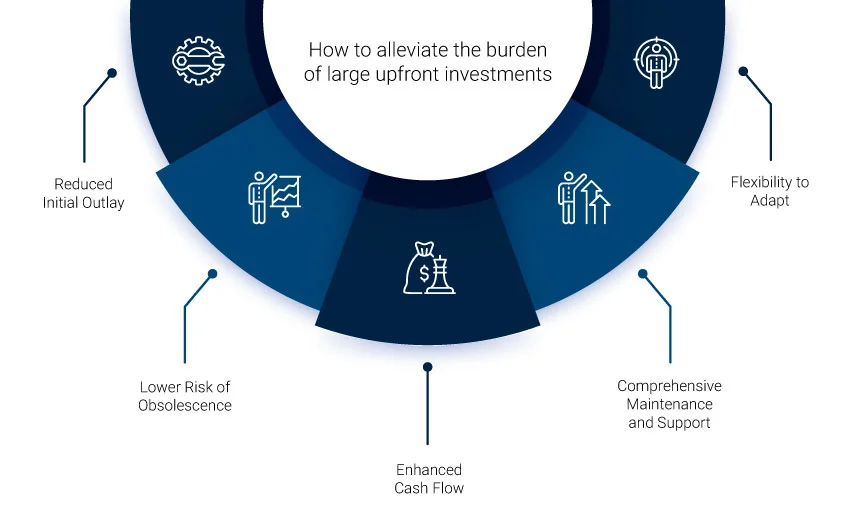August 9, 2024 - by Synoptek
When markets are volatile and budget constraints are high, organizations don’t have the luxury of making the wrong decisions about technology investments. Equipment purchases, technology investments, software licensing, infrastructure development, maintenance and upgrades, and installation costs are just some of the capital expenditures that significantly impact a company’s financial strategy. Partnering with a managed services provider (MSP) offers an intelligent way to access essential IT services and solutions while gaining valuable investment protection.
Unlock the Secret to Smarter IT: Why Managed Services Matter?
Today’s leading-edge solutions become outdated faster than estimated. So, a managed services approach provides the agility to adapt to the IT environment, ensuring that budgets aren’t tied up in long-term technology investments.
Managed services providers offer the financial flexibility of a subscription-based approach. They allow organizations to transition technology spending from a capital expenditure (CapEx) to an operating expense (OpEx) model. Hardware, software, and service costs are bundled into a single contract with a predictable monthly payment. This allows for improved cash flow management, capital preservation, and a more manageable expense structure.
Common Challenges Businesses Face with Traditional CapEx Models
What is a good choice – cash today or growth for the future? Organizations struggle to balance short-term needs and long-term investments when conducting a capital expenditure analysis. While designating proper funding for capital-intensive projects, companies face challenges like:
Large Upfront Costs
Technology adoption often requires significant upfront investments, which can be challenging for businesses with limited budgets. This can make allocating funds effectively throughout the digital transformation lifecycle difficult.
Complexity in Approval Processes
The traditional CapEx approach involves lengthy and complex approval processes. These eventually lead to delays and inefficiencies as multiple stakeholders must review and approve projects, prolonging decision-making times.
Difficulty Assessing Value
Evaluating the value of technology projects can be subjective and complex. Traditional methods often rely on single-dimensional metrics like net present value (NPV), which may not capture a project’s full impact, leading to poor investment decisions and missed opportunities.
Resource Constraints
Technology implementation projects often require significant resources, including personnel, equipment, and infrastructure. Limited resources can hinder the ability to execute projects effectively, leading to cost overruns.
Maintenance
Maintaining and upgrading capital expenditure (CapEx) assets can be expensive and time-consuming. A significant portion of the budget can be tied to ongoing maintenance rather than allocated to more strategic initiatives.
Limited Flexibility
Traditional CapEx models often involve long-term commitments to specific technologies or infrastructure. This lack of flexibility can make adapting to changing business needs or technological advancements difficult, potentially leaving businesses behind in innovation and competitiveness.
The Shift to Managed IT Services
Managed IT services involve outsourcing various IT functions to a third-party vendor or a managed services provider (MSP). This model encompasses many services, including network monitoring, cybersecurity, data backup, software updates, and help desk support. With an ingrained proactive approach, MSPs actively monitor and maintain IT systems to pre-empt and prevent issues before they arise.
Partnership with a managed service provider is usually based on a subscription-based model, which allows businesses to pay a fixed fee. With such predictable monthly expenses, organizations can better manage their budgets, nullifying the impact of unpredictability in traditional CapEx investments.

Benefits of Managed IT Services
The transition to managed IT services offers businesses a strategic advantage by reducing upfront costs, enhancing flexibility, and allowing them to focus on their core competencies while leveraging expert IT support. The benefits include:
Financial Benefits
A predictable cost structure is the most significant financial benefit of managed services for capital planning and expenditure. With a fixed monthly fee, organizations can more accurately forecast their IT expenses, maintain a steady cash flow, and allocate resources without worrying about unexpected costs.
Reduced Upfront Investment
Managed services providers allow organizations to access advanced technology and infrastructure without the burden of significant investments.
- Lower Capital Outlay: Unlike traditional IT models that require substantial capital expenditures for hardware, software, and infrastructure, Managed IT services enable organizations to invest in technology without straining their budgets.
- Access to Cutting-Edge Technology: By outsourcing IT needs to a qualified managed services provider, businesses can minimize the financial risk associated with large purchases. This access enables them to remain agile in a rapidly changing technological landscape.
Tax Advantages of OpEx vs. CapEx
Managed IT services typically fall under operating expenses rather than capital expenditures. This distinction is crucial when considering tax implications. While CapEx investments are depreciated over time, OpEx expenses can often be fully deducted in the year they are incurred. Deducting OpEx in the same year can provide immediate tax benefits and improve cash flow.
Flexibility and Scalability Benefits
As a company grows, its IT needs often change and expand. New employees, offices, or product lines may require additional servers, storage, or network capacity to support the increased workload. Some businesses witness massive shifts in demand based on the time of year or seasonal variations. Shifts in consumer preferences, new technologies, or industry needs require quick company product or service changes. Managed services providers can quickly provide additional resources, such as servers, storage, or network bandwidth, without delays or overcommitting capital associated with traditional procurement processes.
When comparing in-house IT provisioning to utilizing managed services providers, several vital differences emerge:
- Speed and Efficiency: Provisioning in-house resources often involves lengthy processes, including budgeting, purchasing, and installation. In contrast, managed services providers can deploy resources almost instantly, leveraging their existing cloud infrastructure and expertise to meet urgent business needs.
- Expertise and Focus: While in-house teams may deeply understand the organization’s needs, they may lack broad technological expertise. MSPs specialize in various technologies and can provide insights and solutions that in-house teams might not have access to, enhancing overall IT performance.
According to IDC, organizations that partner with a managed IT services provider can reduce operational costs by up to 30%. This reduction is primarily due to improved resource management and eliminating inefficiencies associated with in-house IT operations.
Risk Mitigation Benefits
MSPs conduct thorough risk assessments to identify potential vulnerabilities and implement tailored IT strategies that address specific business needs. Other benefits include:
- Continuous Monitoring and Support: By providing 24/7 monitoring and support, MSPs can quickly identify and address potential issues that reduce the risk of downtime and operational disruptions.
- Incident Response Planning: MSPs develop and implement comprehensive incident response plans to prepare for potential security breaches or IT failures to minimize possible losses.
- Streamlined Vendor Management: Organizations can simplify vendor management by consolidating multiple IT services under a single MSP, allowing easier service adjustments and quicker response times.
Optimize Your Cash Management Through Managed Services
Managed Services continue to play a pivotal role in supporting digital transformation activities by offering the right expertise, skilled resources, and strategic guidance. As businesses strive to thrive, managed IT services providers help navigate the complexities of integrating digital solutions into existing processes while optimizing capital expenditures.
The subscription-based model of a managed IT services contract improves financial flexibility and preserves capital for other strategic investments by shifting technology spending from CapEx to OpEx. As market conditions continue to evolve rapidly and cost pressure from economic uncertainty reigns, MSPs can help organizations budget resources accurately, maintain a competitive edge, and anticipate future needs.
Are you looking for a qualified managed services company in Denver? We can help! Talk with our managed services experts today to begin the transition!


